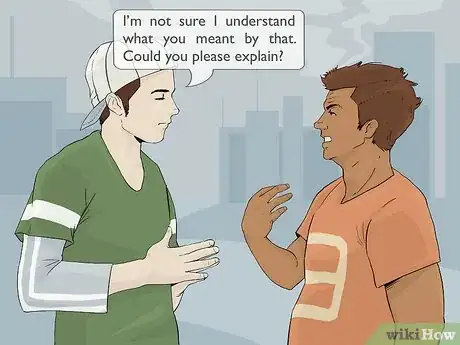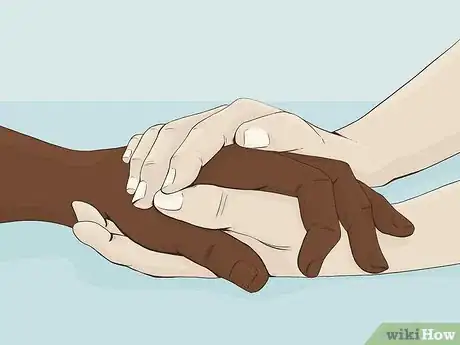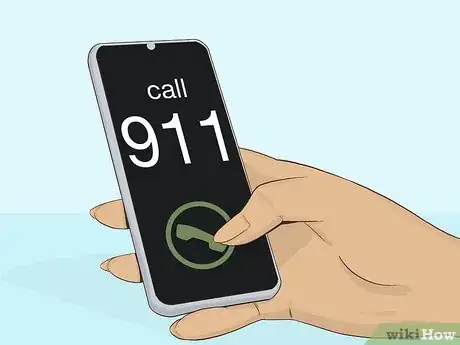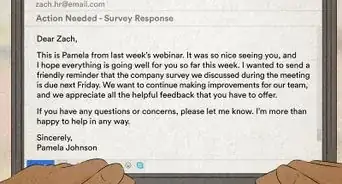This article was co-authored by Christy Irvine, PhD and by wikiHow staff writer, Megaera Lorenz, PhD. Dr. Christy Irvine is a Licensed Clinical Psychologist and the owner of her private practice out of Portland, Oregon. With over 10 years of experience, she specializes in individual and couples therapy using various techniques including Emotionally Focused Therapy (EFT), Acceptance and Commitment Therapy (ACT), Interpersonal-Process Therapy, and Cognitive Processing Therapy (CPT). Dr. Irvine holds a B.A. in Psychology from Whitman College and a Ph.D. in Clinical Psychology from The University of Connecticut.
There are 13 references cited in this article, which can be found at the bottom of the page.
This article has been viewed 18,905 times.
People are complicated. It’s normal to feel confused by someone’s behavior or words from time to time. Luckily, clearing up your confusion is often as simple as just talking to the other person and asking what’s up. In this article, we’ll talk you through a few ways to react the next time someone’s actions leave you scratching your head.
Steps
Expert Q&A
-
QuestionHow do you deal with difficult people in your life?
 Christy Irvine, PhDDr. Christy Irvine is a Licensed Clinical Psychologist and the owner of her private practice out of Portland, Oregon. With over 10 years of experience, she specializes in individual and couples therapy using various techniques including Emotionally Focused Therapy (EFT), Acceptance and Commitment Therapy (ACT), Interpersonal-Process Therapy, and Cognitive Processing Therapy (CPT). Dr. Irvine holds a B.A. in Psychology from Whitman College and a Ph.D. in Clinical Psychology from The University of Connecticut.
Christy Irvine, PhDDr. Christy Irvine is a Licensed Clinical Psychologist and the owner of her private practice out of Portland, Oregon. With over 10 years of experience, she specializes in individual and couples therapy using various techniques including Emotionally Focused Therapy (EFT), Acceptance and Commitment Therapy (ACT), Interpersonal-Process Therapy, and Cognitive Processing Therapy (CPT). Dr. Irvine holds a B.A. in Psychology from Whitman College and a Ph.D. in Clinical Psychology from The University of Connecticut.
Licensed Clinical Psychologist Say something like, “I feel very confused and upset when you suddenly start insulting me out of nowhere. I’m not going to talk to you when you’re acting that way. We can try again when you’re ready to talk respectfully.”
Say something like, “I feel very confused and upset when you suddenly start insulting me out of nowhere. I’m not going to talk to you when you’re acting that way. We can try again when you’re ready to talk respectfully.”
References
- ↑ https://www.psychologytoday.com/us/blog/evolution-the-self/201610/emotionally-upset-20-ways-defeat-negative-feelings
- ↑ https://www.psychologytoday.com/us/blog/sustainable-life-satisfaction/201909/are-you-guilty-making-too-many-assumptions
- ↑ Christy Irvine, PhD. Licensed Clinical Psychologist. Expert Interview. 9 April 2021.
- ↑ https://www.psychologytoday.com/us/blog/counseling-keys/201507/how-resolve-misunderstanding
- ↑ https://kidshealth.org/en/teens/understanding-others.html
- ↑ https://www.theatlantic.com/health/archive/2015/04/mixed-signals-why-people-misunderstand-each-other/391053/
- ↑ https://www.helpguide.org/articles/relationships-communication/nonverbal-communication.htm
- ↑ https://www.naeyc.org/our-work/families/observation-key-to-understanding-your-child
- ↑ Christy Irvine, PhD. Licensed Clinical Psychologist. Expert Interview. 9 April 2021.
- ↑ https://greatergood.berkeley.edu/article/item/six_habits_of_highly_empathic_people1
- ↑ https://psychcentral.com/blog/imperfect/2020/04/how-to-set-boundaries-with-toxic-people
- ↑ Christy Irvine, PhD. Licensed Clinical Psychologist. Expert Interview. 9 April 2021.
- ↑ https://www.today.com/health/aha-understanding-mind-games-men-play-1C9399212
- ↑ https://www.psychologytoday.com/us/blog/toxic-relationships/201907/covert-tactics-manipulators-use-control-and-confuse-you
- ↑ https://www.rethink.org/advice-and-information/carers-hub/responding-to-unusual-behaviour/






































































